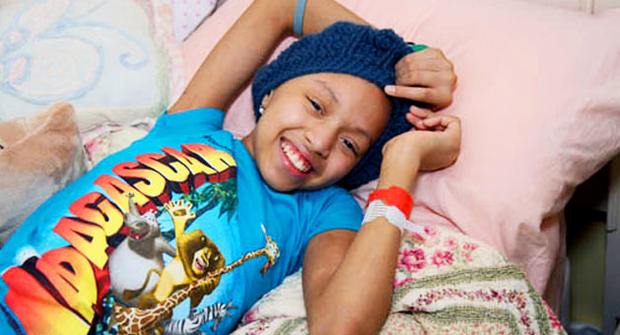Lion King Actress' Transplant Miracle? Will Cord Blood Save Shannon Tavarez's Life?
NEW HYDE PARK, N.Y. (CBS/AP) Shannon Tavarez became a Broadway star at just 11 years old, landing the role of Young Nala in "The Lion King."
She won the role in an open audition - her first.
But just seven months into her dream role, her doctor's gave her a terrifying review - acute myeloid leukemia.
They told her a bone marrow transplant was her best chance of beating the deadly cancer, but a match couldn't be found. Shannon is of mixed heritage, both African American and Hispanic. Mixed donors are underrepresented amongst bone marrow donors.
But Shannon's doctors didn't give up. On Tuesday, they tried another approach. They performed an umbilical-cord blood transplant at Cohen Children's Medical Center in New Hyde Park, N.Y.
"I'm just praying everything works," her mother Odiney Brown told the NY Daily News before the procedure.
So far she's in good shape, Dr. Joel Brochstein said in a statement, but it will take at least two weeks to tell if the procedure was successful.
Umbilical cord blood transplants are becoming an increasingly attractive option for people with cancers of the blood. They are far easier to match than bone marrow, although transplants are harder for larger patients because there are fewer cells available, says Kathy Welte, director for the Center for Cord Blood at the National Marrow Donor Program.
Unfortunately, few people realize that cord blood can be donated and the current national supply is small. Only 175,000 cord blood units are currently stored in public banks. Compare that to the 14 million potential bone marrow donors who have registered globally.
"Imagine throwing a lifesaving treatment in the garbage. That's exactly what happens in the United States over ten thousand times a day because we do not routinely offer to collect precious umbilical cord blood at the time of birth," CBS News medical correspondent Dr. Jonathan LaPook wrote in June.
Donating cord blood to a public cord blood bank costs a family nothing. But because of lack of funding, only 170 of the nation's 5,815 hospitals - just three percent - are set up to collect it. In 2005, government legislation created support for National Cord Blood Inventory (NCBI) cord blood banks.
"Because it's not routinely offered at the time of birth, donating umbilical cord blood to a public bank requires some initiative," wrote Lapook. "But if umbilical cord blood were donated in only five percent of all births, the goal of 500,000 units would be reached within two years. And since the blood can be frozen and stored for at least twenty years, we would soon have a plentiful and growing supply that would provide a match for nearly everybody."
Interesting in donating cord blood? Find out more here.
